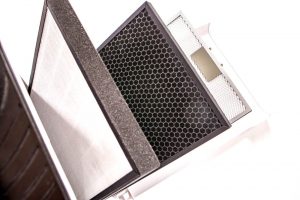HEPA filters have become the industry standard for commercial air filtration in nearly every industry. They’ve even made their way into a variety of our home products, causing them to be cleaner, more efficient, and all-around improved.
Every carefully designed HEPA filter is carefully designed and constructed to maintain the quality standard. They rely on multiple mechanisms, such as diffusion, interception, and impaction, to remove at least 99.95 per cent of all airborne particles that have a diameter of 0.3 microns. That filtration efficiency increases for particles with a larger or smaller diameter.
 These filters were first made popular during the 1950s. At that time, HEPA was a trademarked brand name. The filters were of such high-quality that it became a term to refer to any air filter with extremely high efficiency. Today, it is an efficiency standard, and any HEPA filter must meet those efficiency requirements to carry the HEPA title.
These filters were first made popular during the 1950s. At that time, HEPA was a trademarked brand name. The filters were of such high-quality that it became a term to refer to any air filter with extremely high efficiency. Today, it is an efficiency standard, and any HEPA filter must meet those efficiency requirements to carry the HEPA title.
If you work in any commercial industry, then you’ve probably encountered one of these before. They are extremely useful in medical fields, food storage, nuclear facilities, vehicles, electronics, and pharmaceutical companies. Simply put, any person or company that needs the cleanest air possible is going to rely on one of these filters. There are very few competitive alternatives.
We have also compiled a list of the top air purifiers available to compare the best HEPA air purifiers.
Contents
Key Takeaways
- HEPA filters, short for “High-Efficiency Particulate Air,” are essential for air filtration across various industries and can improve home air quality. To be considered true HEPA filters, they must remove at least 99.95% (or 99.97% in the US) of airborne particles with a diameter of 0.3 microns.
- HEPA filters are typically composed of woven glass fibres, and they use multiple mechanisms like impact, interception, and diffusion to capture particles of different sizes, making them effective for clean air.
- HEPA filters are affordable, efficient tools for delivering clean air, especially beneficial for individuals with asthma or allergies. It’s crucial to distinguish between true HEPA filters and HEPA Type filters, as only the former meet the required filtration standards, while the latter may not be as effective.
Are you curious about HEPA filters, how they work, and whether you should consider investing in one for your home or business? We’ve compiled some of the most commonly asked questions as well as their answers. Hopefully, this FAQ will help you better understand exactly how useful a HEPA certification can be.
What Does HEPA Stand For?
HEPA stands for “High-Efficiency Particulate Air”. A name like that explains why no ordinary filter can be considered a HEPA filter even if it has a more advanced construction. High-efficiency is the key component of a HEPA filter. In the UK, that means it must filter at least 99.95 per cent of particles in the air. In America, that standard is slightly higher with a required filtration rate of 99.97 per cent.
If the filtration rate is even slightly lower, then the “H” is dropped from the standard title. For example, an air filter in the UK that removes 98 per cent of airborne particles is considered an EPA filter. EPA stands for “Efficient Particulate Air Filter”.
In contrast, if an air filter is possible of removing more than 99.999 per cent of particles it is considered a ULPA filter or “Ultra Low Penetration Air Filter”. ULPA filters are not commonly used except for in specific applications like medical labs or semiconductor manufacturing plants.
What Is a HEPA Filter Made Of?
The average HEPA filter created today is made from an array of glass fibres that are woven together and twisted in numerous directions. The materials might have improved over the decades since the 1950s when the HEPA filter became well known, but the general construction and mechanisms of the filter have not. There are some cases where a HEPA filter must be made from alternative fibres or synthetic materials other than glass.
How Does a HEPA Filter Work?
A HEPA filter may do a lot of good work, but it is not a particularly confusing tool to understand or use. In layman’s terms, particles that attempt to pass through the filter are captured by the mat of woven fibre. However, it is slightly more complicated than membrane filters where particles smaller than the gaps between the fibres are capable of passing through. Instead, HEPA filters use at least three different mechanisms to capture particles regardless of their size.
Impact
 Impact is the most common mechanism, and it is how most particles larger than 1 micron are captured. As the large particles move through the overlapping layers of glass or fibre, they eventually make impact. The air flows through the filter along the curves of the fibres, which are twisted in various directions. These twisted fibres increase their efficiency. Finally, the effectiveness of impact filtration is increased even further by decreasing the space between fibres or increasing the velocity of the air.
Impact is the most common mechanism, and it is how most particles larger than 1 micron are captured. As the large particles move through the overlapping layers of glass or fibre, they eventually make impact. The air flows through the filter along the curves of the fibres, which are twisted in various directions. These twisted fibres increase their efficiency. Finally, the effectiveness of impact filtration is increased even further by decreasing the space between fibres or increasing the velocity of the air.
Interception
Interception is the second method of activation, and it primarily affects particles that are smaller than 1 micron. Unwanted bacteria are the most common particles in this size range. These tiny particles could normally flow through a mat of fibres without getting stuck in any of the small gaps. However, these particles are so small that they will naturally follow the flow of air around the fibres. The weight of the particles slows them down, and within a certain a distance of the fibres, they will not be able to adjust course in time and thus become stuck.
Diffusion
The third mechanism is called diffusion, and it’s a little more complicated than the other two methods. This type of mechanism works to filter particles that are smaller than 0.3 microns. These particles are so small that they do not regularly move in a straight line or with the flow of air. They are instead continually bouncing off of gas molecules inside the filter. This chaotic and constant zig-zag pattern eventually leads them to a glass fibre where they will be stuck.
What Are the Benefits of a HEPA Air Filter?
 HEPA filters are a simple and affordable method of delivering clean air. Remember, these filters were designed almost 100 years ago, and they haven’t changed too much since then. Their practical, yet simplistic design equates to meagre manufacturing costs. These are some of the best air filters you can buy, and they also happen to be very affordable. That’s a great combination.
HEPA filters are a simple and affordable method of delivering clean air. Remember, these filters were designed almost 100 years ago, and they haven’t changed too much since then. Their practical, yet simplistic design equates to meagre manufacturing costs. These are some of the best air filters you can buy, and they also happen to be very affordable. That’s a great combination.
HEPA filters are one of the best tools that people living with asthma can use to eliminate allergens. This also applies to anyone with allergies, whether minor or severe. Allergens like pollen, mould spores, and smoke can linger in the air and cause harm at random. It’s not quite as simple as dealing with a peanut allergy because you can’t see all of what’s in the air. But you can trust a HEPA standard filter to do the job of removing those dangerous allergens on your behalf.
What Is the Difference Between a True HEPA Filter and a HEPA Type Filter?
Only a True HEPA filter meets the required filtration standards. The term HEPA has become synonymous with high-quality filters, and a lot of brands out there try to take advantage of this fact. You may find that some products are listed as True HEPA filters while others are listed as HEPA Type filters.
It might seem like a minor difference, but it’s very significant. In the UK, a True HEPA filter is one that filtrates at least 99.95 per cent of particles. A HEPA type filter does not meet this standard. In reality, a HEPA Type filter is just another name for an EPA filter. Brands attach the HEPA title in hopes of attracting customers who didn’t do their research. HEPA Type is not an official standard, and you should be wary of any product that uses the title.
Heat Pump Source: Reliable Heating and Cooling Solutions
At Heat Pump Source, we take pride in our unwavering commitment to serving the UK with top-tier HVAC solutions. From the efficiency of heat pumps and the cool relief of air conditioning to the warmth of boilers, radiators, and underfloor heating, our dedicated team is always at the forefront of innovation. We understand the unique needs of every household and business, and we strive to provide dependable health and cooling products and services that are tailored just for you. Ensuring your comfort and satisfaction is our utmost priority. Whether you have questions, need guidance, or require support, we’re always here to assist. Please don’t hesitate to contact us; we’re eager to be of service.
Conclusion
Now that you know what a True HEPA filter is and how they work, you don’t have to worry about being fooled by dishonest brands. You can invest in the best possible air filters and improve the quality of the air for your home or business.
About the Author
At Heat Pump Source, our articles are the product of a collaborative effort among a team of highly skilled HVAC experts. Our dedicated professionals, hailing from diverse backgrounds in heating, ventilation, air conditioning, and refrigeration, contribute their extensive knowledge and experience to every piece of content. This multidisciplinary approach ensures comprehensive coverage. Our commitment is to deliver authoritative, reliable, and tailored advice to meet the unique needs of every household and business across the UK.

